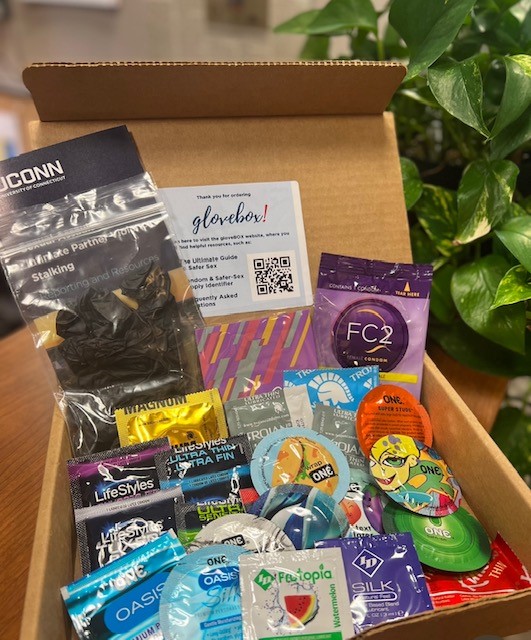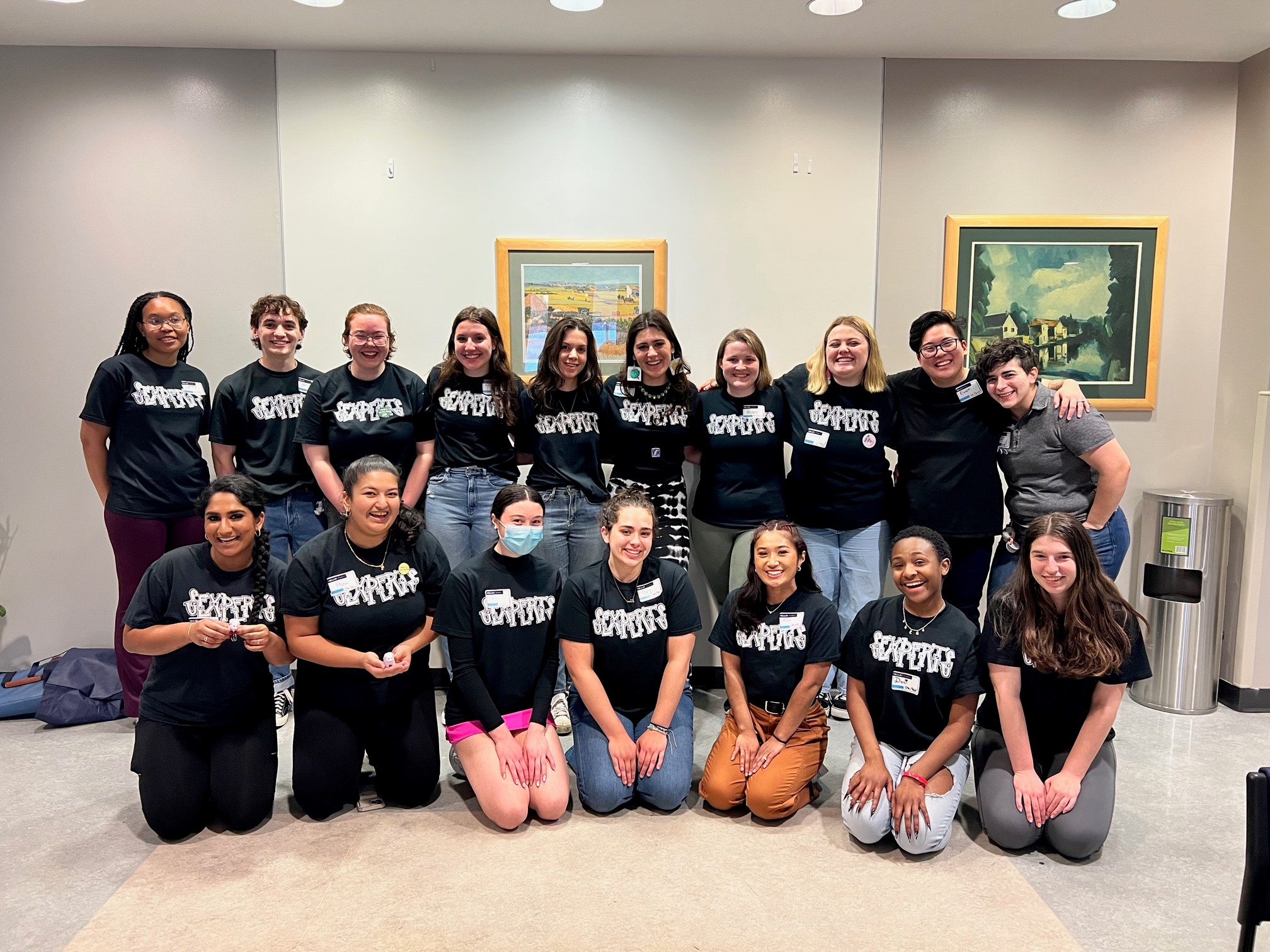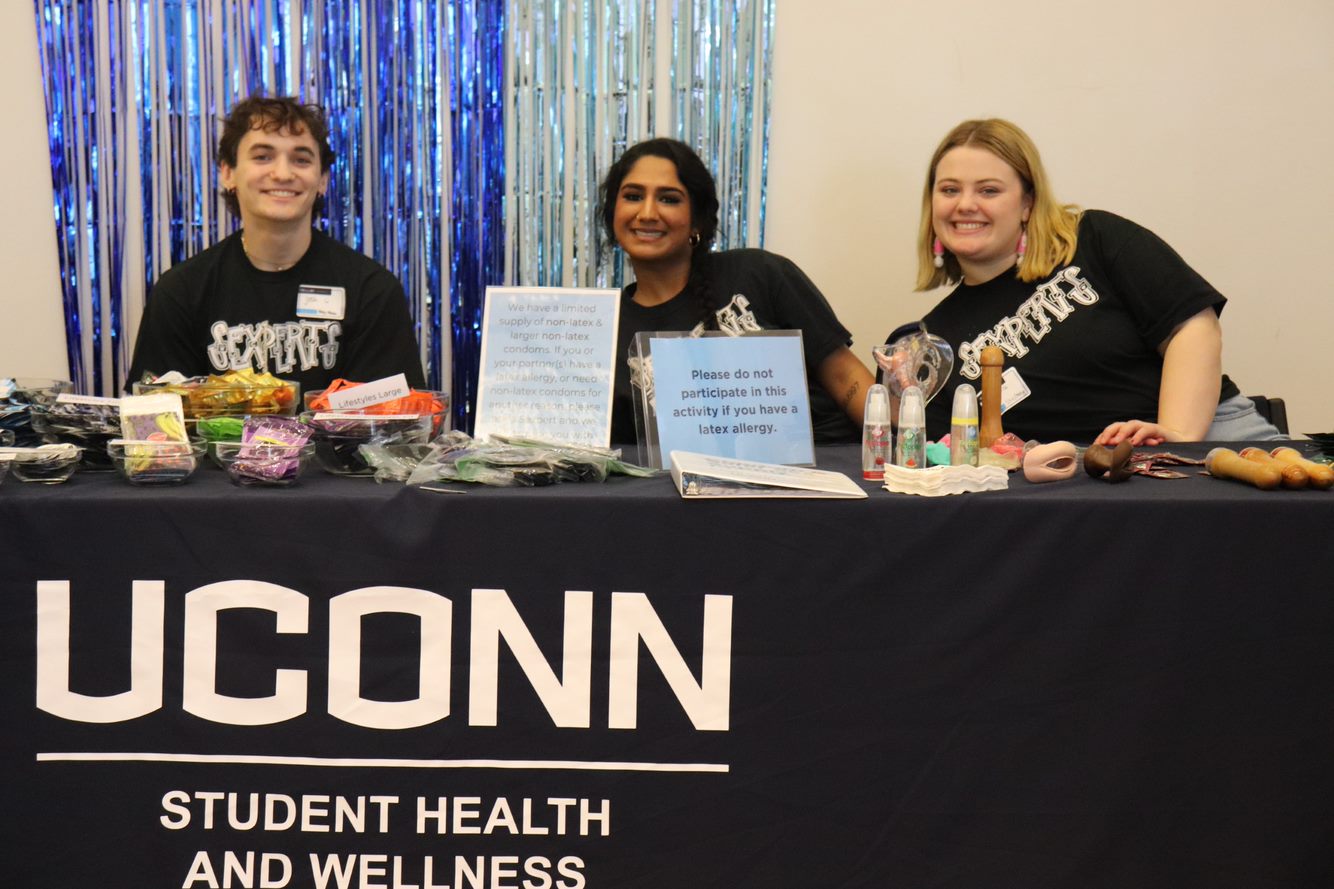The UConn Sexperts
Student Health and Wellness is home to The UConn Sexperts, a paid peer health education program composed of 8 highly dedicated students who are passionate about promoting sexual health on the UConn campus.
Our Mission
To provide UConn students with education, resources, and opportunities to have open and honest conversations about sex and sexuality - so they feel comfortable and empowered to make informed decisions regarding sex.
Our Vision
A sex-positive campus where sexual health education and services can be accessed without fear, stigma, or shame.
Our Values
Honesty
- We ensure the delivery of accurate, current, culturally competent health information.
- We do not let our personal opinions interfere with our interactions or the delivery of the content.
- We utilize and rely on open and direct communication.
Respect
- We honor and respect people's decisions & choices about their sexual health and sexuality.
- We view sexual health through a social-justice lens, and prioritize diversity, equity, and inclusion in all facets of our work.
- We practice cultural humility and recognize differing needs based on our unique and intersecting identities.
- We uphold individuals' right to privacy.
Support
- We build supportive relationships with those we are helping.
- We hold space for others to be themselves, to share freely and to ask questions.
- We create and respect boundaries and individual needs throughout the educational process.
- We deliver content in an approachable way that is easy to understand and apply.
Autonomy
- We believe sexual health is a human right, and a core component of our overall health & well-being.
- We believe that individuals know themselves and their bodies best – that they have personal agency to make the best choices for themselves.
- We will never compromise autonomy – we put bodily integrity, and freedom to define sexuality and make choices about our bodies without coercion or violence at the forefront of our work.
- We celebrate the expressions of our unique sexualities and view those expressions as forms of liberation.
Our Programs & Initiatives

What's gloveBOX? gloveBOX is UConn's free condom distribution program! Launched in 2019, gloveBOX has shipped thousands of free boxes containing condoms, dental dams, and lubrication to students across campus. With six different types of boxes, students can order a box that fits their needs, with options to customize based on style, size, and material. To learn more about gloveBOX, order a box, and access educational materials about sexual health, click here!
Sex can be hard to talk about! We’re here to make things easy by providing an anonymous and judgement-free space for you to ask any sex-related questions you have. All you have to do is fill out the form with your question, and we’ll do our best to answer your question on our website within the week (we will remove any identifying information before we post it publicly!)

*Please note that this form is for educational purposes only, and not for individualized medical advice. We encourage all students with specific questions about their sexual health (i.e. are experiencing symptoms, are concerned about potential pregnancy/exposure to STIs, etc.) to make an appointment with a medical provider by clicking here. If you are experiencing an emergency or mental health crisis, please call 911. This form will not trigger an immediate response. Additionally, submissions to this form do not constitute notice to the University regarding Prohibited Conduct under the Policy Against Discrimination, Harassment, and Related Interpersonal Violence. If you've experienced a sexual harassment, sexual assault, stalking, or intimate partner violence, we encourage you to seek support. If you'd like more information about support resources and reporting options, please click here. Remember, it is NOT your fault and you are NOT alone.

Coming soon!
It’s perfectly normal to be sexually attracted to different parts of the body and/or physical features!
Attraction varies widely from person to person, and can be influenced by a wide variety of psychological, biological, and social factors, ranging from adrenaline, scent, personality, the media we consume (including pornography), our culture, etc.
What some people may consider to be a big turn on, others may have little interest in. It’s all a matter of personal preference. There are so many ways to appreciate different types of bodies!
Thanks so much for asking! There is so much information about sexual health that it can sometimes feel overwhelming finding a place to start. Thankfully, you came to the right place! The UConn Sexperts offer non-judgmental resources including information, safer sex supplies, and support.
While it is true that abstinence prevents pregnancy and STIs, teaching that as the only option can leave people without accurate information about their bodies and safer sex practice. We are here to empower you to make choices that feel right for you! If you and your partner(s) have decided to start having sex, it’s a good idea to get info on make it safer and more pleasurable!
Birth control comes in many different forms and is an effective way to prevent pregnancy. Some of the most popular methods of birth control include: The Pill (combination estrogen and progestin, or progestin only), the Patch, the Shot, the Ring, the IUD (copper or hormonal), or the Implant (Nexplanon). You may find that one type of birth control is more suited to your needs and lifestyle than another. Birth control pills (sometimes referred to as OCPs, or oral contraceptive pills) are usually taken daily and do not require a procedure or injection. If you are looking for something that you can “set and forget” you may prefer a long-term option like an IUD or Implant. There are also options like the Depo-Provera shot which can be administered every three months, or patches which may be replaced every few days.
Other non-prescription contraceptive strategies include the Fertility Awareness Method (tracking your ovulation days and abstaining from sex on those days) or the withdrawal method (aka pulling out), however these methods require practice and are typically less effective than prescription forms of birth control.
If you are looking for a prescription type of birth control through UConn Student Health and Wellness, you can make an appointment with a SHaW provider by calling 1-860-486-4700. Please be advised that SHaW does not offer IUDs on-site, but can refer you to a local provider!
Remember, birth control only protects against pregnancy, not sexually transmitted infections. Using a barrier like an internal or external condom during penetrative sex helps decrease risks of both STIs and pregnancy. When used regularly in combination with birth control, condoms are great to better protect yourself and your partner(s). You can order up to 60 free condoms a semester through this resource available to students through the gloveBOX program.
We hope that this information gives you a good place to start! If you have any other questions please feel free to stop by our Peer Support drop-in hours or speak to a SHaW provider!
If that’s something that works for both of you, then yes! There’s nothing wrong with staying friends with someone you used to be in a relationship with, regardless of whether the relationship was romantic, sexual, both, or somewhere in-between. People decide all the time that they make better friends than romantic partners. Despite much of the social messaging, friendly breakups don't have to be awkward! Of course, if there has been hurt, disrespect, mistreatment or mis-matched feelings about the breakup, you or your ex might not want to stay in contact, and that is completely ok. It is also perfectly normal if you change your mind about what kind of contact you may want to maintain. At the end of the day, as long as everyone is happy with how the relationship progressed, it isn’t weird, wrong, or suspicious for someone to remain friends with an ex after an amicable breakup.
If you ever want to talk about relationships with a member of the UConn Sexperts, our drop-in hours are linked here!
Currently, birth control options available directly through SHaW include: the Pill, Patch, Shot, and Ring. These options can be prescribed by a SHaW provider and are typically billed through insurance or paid out of pocket. Students seeking an IUD (either copper or hormonal), or the Implant would be able to access a referral through SHaW, can speak to their provider, or get an IUD through a local Planned Parenthood. Again, it would depend on your insurance or if you choose to pay out of pocket what the cost of your IUD would be.
If you have questions on how to decide what contraceptives may be right for you but don’t know where to start, feel free to visit the UConn Sexperts Drop-In Hours to get information about the different types of contraceptives, and resources to speak with providers.
To prevent pregnancy and better protect yourself from STIs, check out gloveBOX! Students can order up to 20 free condoms 3x a semester for delivery (on campus students) or pick up (off campus students).
Good question! There are plenty of things that you can do to enhance pleasure for yourself and your partner when engaging in penetrative anal sex. First and foremost, it is important that there is open communication between partners regarding comfort and discomfort. If anal sex becomes painful, it is a good idea to stop and check in with your partner(s).
Using silicone-based lubrication for penetrative anal sex can increase pleasure because it lasts longer and does a better job minimizing friction compared to water-based lubrications. You may find that changing the type of lubricant may increase pleasure for you both!
It is important to note that silicone lubes do risk breaking down silicone toys. So, if you are using a sex toy during anal sex, make sure that you are not using a silicone toy with a silicone-based lubricant. Some alternate materials for toys include glass and body safe metals. Additionally, keep in mind oil-based lubricants break down condoms, which leads to an increased risk of the condom breaking.
It can be difficult to work up to penetrative sex. You and your partner(s) may want to consider digital penetration (fingering), oral sex (also called rimming) and/or smaller anal toys as part of foreplay before moving on to penile-anal penetration.
If you still find that there is discomfort with this particular type of sexual activity, you may want to try products like the Ohnut, which is a series of flexible rings worn by the penetrating partner that acts as a buffer to help reduce pain during penetrative sex.
Ultimately, if penetrative anal sex is not something that you find pleasure - that’s fine too! It can give you and your partner(s) an opportunity to learn something about what kinds of sexual activities you enjoy!
Great question! In Connecticut, you do not need parental consent to obtain prescription birth control - at any age. Students at UConn can make an appointment with a provider at SHaW if they interested in forms of birth control such as the Pill, Shot, Patch, IUD, Implant, or Ring.
However, if you plan to use your insurance to cover the costs of your birth control, be aware that insurance services will list the billing code attached to the services received. If you are still on your parents' insurance, keep in mind that there is a possibility that the explanation of benefits will show a birth control consultation or prescription.
To maintain confidentiality, you might prefer to pay for these services out of pocket, although that can be quite costly. You could also opt to sign up for your own insurance plan, but again, there's a chance it's cheaper to remain on your parents' insurance until age 26.
If you have privacy concerns, a long-term form of birth control might be good option. An intrauterine device (IUD) can last anywhere from 3 to 12 years, and the Implant lasts for five. Choosing a long-term form will reduce the number of services and prescriptions needed. Or, you could opt for an over-the-counter option. Barrier methods, such as external and internal condoms are highly effective at preventing pregnancy. You can also purchase contraceptives which act as spermicide, like VCF (vaginal contraceptive gel), however it contains an ingredient called nonoxynol-9, which can cause irritation and lead to increased risk of STIs.
If you need access to free condoms during the school year, the UConn Sexperts provide a service called gloveBOX where you can access 20 free condoms at a time! Check out the link below! gloveBOX | Student Health and Wellness (uconn.edu)
Just like other types of appointments at Student Health and Wellness, all STI testing requires an appointment. While same day appointments are not guaranteed, our schedulers will always do our best to get you an appointment as soon as possible!
SHaW does occasionally offer free sexually transmitted infection (STI) testing events in the Hilda May Williams building! You do need to make an appointment for these clinics, so keep an eye on SHAW’s website to see when they are scheduled every semester. There are also semi regular testing events for HIV and Hepatitis C held through the UConn Rainbow Center.
If you feel you may have been exposed to an STI or are exhibiting symptoms, you can make an appointment by calling (860)-486-4700. This testing will be billed through your insurance and will display the insurance billing code associated with the tests.
Keep in mind that if you believe you have been exposed to a sexually transmitted infection, it's not always recommended to be tested the day after. Many STIs are not detected by a test for a few weeks after exposure, and testing before this timeframe may result in a false negative. Below is a list of common STIs and the "window period" (the phase between being exposed to an infection and the time when a test can detect it in the system):
- Chlamydia: Between 1 and 5 days.
- Gonorrhea: Between 2 and 6 days.
- Syphilis: Between 3 and 6 weeks.
- HIV: Depends on the test, but generally 30-90 days.
- Herpes: 16 weeks (however, herpes generally does not need a test for a diagnosis - if you experience symptoms such as sores, visit a provider - they can make a diagnosis based on physical exam).
- Hepatitis C: 6 weeks
- Trichomoniasis: Between 3 and 7 days.
If you have more specific questions, please make use of the UConn Sexpert’s Peer Support Drop-In hours! We are here to help you get answers to any questions about relationships, having difficult conversations, and sexual health that you may have, so stop on by!
Great question! Around 2/3 of people with penises worldwide are uncircumcised, and while circumcision is more common in the U.S. then some other countries, there are minimal differences in pleasure and effects on your health as long as you are practicing good hygiene and safer sex. There’s no right or wrong way to have a body!
Some people may feel unsure or apprehensive about how to approach sex with either someone who is circumcised or uncircumcised, if they have only seen or experienced sex with someone with one type of penis. Our past experiences, religion and culture, and the media we view can all impact attitudes about circumcision as well. For example, media, including pornography, often depict penises as always circumcised, which can also impact what we view as "the norm". However, sex with someone who is circumcised is not that different from sex with someone who is uncircumcised! Depending on whether someone is circumcised or not, they may feel sensation differently. Additionally, people with foreskins may prefer to roll their foreskin back before condom use. As always, ask your partner(s) how they prefer to have their genitals stimulated.
Myth: Most penis-owners are circumcised.
Fact: While common in the United States and within the Christian, Jewish, and Muslim communities worldwide, only 37-39% penis-owners are circumcised globally.
Myth: Uncircumcised penises are unhygienic.
Fact: Uncircumcised penises are not inherently unhygienic! People who are not circumcised, should, however, take extra care to wash the head of their penis and underneath their foreskin to prevent the buildup of smegma (which is a buildup of skin cells and oil).
Myth: Uncircumcised folks are more likely to have infections.
Fact: Transmission risk of some STIs, like HIV or genital herpes, is slightly lower for circumcised folks. However, this risk can be mitigated by practicing barrier methods (such as condoms) to lower the chances of contracting or transmitting any STI’s. Uncircumcised individuals have a slightly higher risk of contracting UTI’s, which can be reduced by practicing good hygiene.
Myth: Circumcision cause sexual dysfunction
Fact: Circumcision does not cause sexual dysfunction, the ability to reach an erection, or have children. Some studies suggest that circumcision does not affect sexual pleasure, sensitivity, however, some conflicting studies and critics of circumcision suggest that removal of the foreskin can impact sensitivity because of the number of nerve endings located in the foreskin.
Regardless of what kind of body you have, one is not “better” than another! Talking to your partner(s) about their preferences may be an awkward conversation to start – but it can increase pleasure for everyone involved!
Many people consider sexuality and sexual desire to be a part of their lives and identities. However, everyone experiences their relationship to sexual desire differently!
For some people, sex is something they think about a lot and they may experience stronger and more frequent sexual desire or arousal This may be referred to as having a “higher libido” or a higher “sex-drive” – and this refers to physiological state, such as experiencing vaginal lubrication or erections. Others may experience no sexual desire at all, or find it difficult to become aroused. There are individuals who have a lower sex drive, or desire sex more infrequently or less intensely. It is also normal to find yourself somewhere in the middle of this spectrum, or you may even find that your sexual desire changes over time, or is more fluid!
It's also important to note that libido is different from sexual attraction to someone. Sexual attraction refers to a feeling people have when they find someone or something sexually appealing to them. Sexual attraction is what may motivate people to have sex or act on.
People who are asexual or consider themselves to be on the asexual spectrum may not experience sexual attraction to others, or only experience sexual attraction within the context of certain relationships, but can still experience sexual arousal, or even have high libidos! However, without the attraction component, the desire to have sex may be minimal.
Wherever you may fall in terms of libido levels or sexual attraction, you are valid! If you ever want to talk about questions related to sexual health or need a non-judgmental space to discuss topics related to sex and sexuality, please feel free to visit the Sexperts during Peer Support Drop-In hours!
It has been normalized to define “sex” as penetrative sex, but oral sex is a very common sexual activity that many people find just as, if not more, pleasurable. It’s important to acknowledge that there is nothing abnormal about your boyfriend’s sexual desires or preferences. For some, performing oral sex is fun even if there is no expectation for the act to be reciprocated – and it sounds like your partner enjoys it! If receiving oral sex is something you like as well, then lay back, relax, and enjoy!
If you‘re concerned because it doesn’t feel as “mutual” as other types of sex, or if it feels awkward having all the attention on you, that’s also understandable! If you find that you get more enjoyment from other activities, it may be a good opportunity to talk with your partner about other sexual activities you prefer or may want to try. And, if ultimately find that receiving oral sex is not something you enjoy at all, having an honest conversation about the types of sexual activities you DO enjoy can help make a more pleasurable experience for both you and your partner(s)!
Sometimes it can feel difficult (or even scary!) to ask for what we want sexually. Not sure how to get started? Here are some examples to get the conversation going!
- “I love that you get so turned on by going down on me – but what I’d really like right now is (insert activity here) how does that sound?”
- “It feels so good when you do that, but I’m more in the mood for (insert activity here) what do you think?”
- “I’m not really feeling this right now – is it cool if we try something else?”
- “What do you think about switching things up tonight, and (insert activity here) for a little bit instead?”
Learning what each other likes sexually requires ongoing communication and can take time, but ultimately can lead to deeper and more intimate connections with partner(s)!
Great question! Rest assured that the chances of getting pregnant from dry humping a.k.a. a form of “outercourse” are very, very, VERY slim. However, it is still important to note that any sexual activity where ejaculation occurs and involves semen coming in contact with the vagina could result in pregnancy.
In a situation like the one you described where both partners are clothed, the risk is almost 0%. There would have to be some additional (and unlikely) mechanics at play (i.e., there would need to be prolonged contact from the semen through the clothing, onto the vulva, and then additional activities like fingering or thrusting to move the semen into the vagina). The risk of pregnancy can increase if there was bare genital contact, or from someone fingering a partner after getting semen on their hands or on a sex toy, but again, the semen would need to move past the vulva INTO the vagina in order to cause a pregnancy. Further, the risk levels change depending on whether or not you are ovulating (when you are most fertile).
While it’s not impossible that dry humping (with ejaculation) can result in pregnancy, it is super unlikely. But, if you are concerned about the risk, it could be helpful to consider birth control and contraceptive options available to you!
In addition, it may be beneficial to speak with your partner or ask that they finish elsewhere to avoid this concern in the future. If you are feeling conflicted about experiences like this and ever need a supportive place to talk through your concerns with a peer health educator, please feel free to utilize the Sexpert’s Peer Support Drop-In hours!
Peer Support Drop-In Hours are a new, free service offered by peer health educators, the UConn Sexperts, on the UConn Storrs campus!
Peer Support Drop-In Hours are a great option for students who have questions about sex and sexual health, are looking for a non-judgmental, laid-back environment to discuss a sex related concern or issue, or are interested in improving their sexual health and personal well-being. Our UConn Sexperts undergo extensive training in various topics of sexual health, and have been trained in evidence-based approaches to peer support. The UConn Sexperts are supervised by a SHaW professional staff member and are required to attend weekly staff meetings for continuing education. UConn Sexperts (and supervising staff) are exempt employees under UConn's Title IX Reporting Obligations.


Spring 2024 Drop In Hours
| Monday | 9am-5pm |
| Tuesday | 3:30pm-5pm |
| Wednesday | 9am-6:30pm |
| Thursday | 9am-11:30am |
| Friday | 9am-11:30am |
During our drop-in hours the UConn Sexperts are trained to provide:
| Education, including: | A supportive environment for discussion surrounding: | Connections to UConn SHaW & off-campus resources, including: |
| Birth control | First-time sexual experiences/debuts | STI Testing |
| Safer-sex strategies | Dating, relationships and communication | Birth control consultation appointments |
| Sexually transmitted infections (STIs) | Sexual decision-making, boundaries, and consent | Pregnancy resources |
| Sexual identity, gender identity, sexual orientation | PReP & PEP | |
| Living with a sexually transmitted infection (STI) | HPV and mpox vaccinations | |
| Pleasure | LGBTQ+ specific sexual health services | |
| BDSM/Kink | Gender-affirming care | |
| Ethnical non-monogamy | Sexual assault victim/survivor support |
Peer support sessions are for educational and support purposes only. Peer support visits are not on-call or emergency services, and are not for individualized medical advice, nor are they counseling or therapy.
- If you are experiencing an emergency or mental health crisis, please call 911.
- If you are struggling with a mental health issue that is severely impacting your well-being, please reach out to SHaW – Mental Health at 860-486-4705 to schedule an appointment, or call our 24/7 hotline at 833-308-3040.
- To make an appointment with a medical care provider, please call SHaW – Medical Care at 860-486-4800.
- If you've experienced sexual harassment, sexual assault, stalking, or intimate partner violence, we encourage you to seek support. If you'd like more information about support resources and reporting options, please click here.
If you wish to make an appointment with a professional staff member to discuss sexual health related concerns, or were referred to do so by a UConn Sexpert, please click here to schedule an appointment with Program Manager for Sexual Health and Peer Education Initiatives, Cassy Setzler.
The UConn Sexperts provide several educational programs and presentations for student groups. These presentations cover a wide variety of topics, ranging from safer-sex practices (i.e. condom use), birth control/contraception, decision-making, consent, pleasure, and more! Some of the groups we work with often include Greek Life, Residential Life, & cultural centers. For a list of our current offerings, and to book a program, visit the Student Health and Wellness program request form by clicking here!
Condom-a-thon (November/December): Hosted for over 15 years, Condom-a-thon is held on or around World AIDS Day (December 1st) at Late Night in the Student Union. Our UConn Sexperts teach participants a safer sex skill, such as how to use a condom, or how to turn a condom into a dental dam. All participants receive a free Dairy Bar ice cream! This year's event will be on December 1st, 2023!
Annual Sexual Health and Wellness Fair (April): Student Health and Wellness, along with support from USG, hosts an annual Sexual Health and Wellness Fair each year in April, where various UConn & community groups and organizations come together to provide students with resources and education about sexual health! Our 3rd Annual Sexual Health & Wellness Fair will be on Monday, April 15th, 2024 from 1pm-5pm in the Student Union Ballroom! Please visit our fair website for more information about our upcoming event and to view resources from past fairs.
Get Involved
UConn Sexpert Job Description 2024-2025
Our application period for the 2024-2025 academic year are now closed. Qualified applicants will be contacted in March for interviews.
If you have any questions about the UConn Sexpert position or application process, please email Cassy Setzler, Program Manager for Sexual Health & Peer Education Initiatives at cassy@uconn.edu.
Collaborate with Us
Have an idea for a collaboration? Want to partner with the UConn Sexperts on an event? Send an email to sexperts@uconn.edu!
If you'd like to book a program with us, please submit a program request here.
Meet the Sexperts

Name: Parker Brobston Pronouns: she/her/hers Semester: 7 Semester as a Sexpert: 4 Major: Spanish and SLHS Hobbies: Hiking, crocheting, baking, reading Why the UConn Sexperts? I feel passionate about empowering students to learn more about their bodies, pleasure, contraceptive options, and informed consent through education!

Name: Ari Fandozzi Pronouns: she/her/hers Semester: 7 Semester as a Sexpert: 4 Major: Psychology Hobbies: Working out, hiking, listening music, hanging out and chatting with friends Why the UConn Sexperts? I wanted to join Sexperts because I am really passionate about educating our generation about proper sex education. The curriculum in high school failed us as a whole as the majority were abstinence based and maybe mentioned contraceptives. I think that everyone should be able to have comprehensive sex education that is inclusive and extensive because a lot of my sex education left me confused and needing to know more.

Name: Claire Murphy Pronouns: she/her/hers Semester: 7 Semester as a Sexpert: 5 Major: Molecular & Cell Biology Hobbies: Acting, dancing, baking, rock painting, and going to the beach Why the UConn Sexperts? I am very interested in public health and health education. I believe that sexual health is an important aspect of healthcare because is affects our physical, mental, and emotional wellbeing. Everyone deserves access to sexual health knowledge and resources, so I am really excited to promote sexual health education and help other students on campus!

Name: Charlise (Charli) Levesque Pronouns: she/they Semester: 7 Semester as a Sexpert: 1 Major: Communications Hobbies: Hiking, Gaming, Painting, and Playing TTRPGs with friends! Why the UConn Sexperts? I found the sexperts through a Health Communication class I was taking and realized how rewarding it was to work alongside such an open-minded and warm community. Now I am looking forward to sharing, educating, and fostering a safe space for sexual health and conversations about sex to counter any stigmas about the topic

Name: Serena Robidoux Pronouns: she/they Semester: 7 Semester as a Sexpert: 1 Major: Biology Hobbies: Reading, crocheting, drawing, playing on my Switch and PlayStation Why the UConn Sexperts? I believe that having a solid understanding of sexual health and wellness is vital for everyone, especially college students. My goal as a Sexpert is to make a difference in students lives through teaching, advocacy, and peer support.

Name: Ira Sunderraj Pronouns: she/her Semester: 5 Semester as a Sexpert: 1 Major: Allied Health Sciences Hobbies: Reading, TV, dance, collecting figurines Why the UConn Sexperts? I believe that education is power! The ability to teach and learn about sexual health is something I want to share with the UConn community.
Name: Carmen Rebert Pronouns: they/them Semester: 5 Semester as a Sexpert: 1 Major: Biology Hobbies: Why the UConn Sexperts?

Name: Riley Fields Pronouns: she/her Semester: 3 Semester as a Sexpert: 1 Major: Human Development and Family Studies Hobbies: Jewelery-making, movies, hiking, baking, listening to music, weight-lifting Why the UConn Sexperts? I believe working with the Sexperts is a great opportunity to collaborate with peers in a safe space while educating ourselves and each other about sexual health. I also want to be a relationship and sex therapist when I'm older, and I believe working as a Sexpert will be a great base for that.

Name: Sugita Mahendarkar Pronouns: she/her Semester: 3 Semester as a Sexpert: 1 Major: Physiology and Neurobiology Hobbies: philosophy, reading, music, art, video games Why the UConn Sexperts? I want to help students feel comfortable discussing and learning about sexual health so that they can be empowered by their understanding of personal wellbeing and healthy living.









